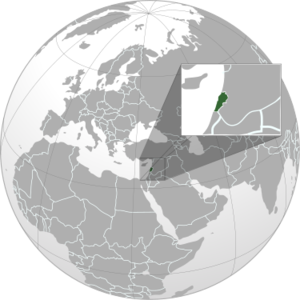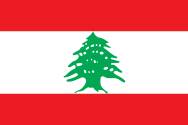Lebanon: Difference between revisions
No edit summary |
No edit summary |
||
| (3 intermediate revisions by the same user not shown) | |||
| Line 16: | Line 16: | ||
}} | }} | ||
{{abr-50|Sept, 2024}} | {{abr-50|Sept, 2024}} | ||
'''Lebanon''', officially the Lebanese Republic, is a sovereign state in Asia. It is bordered by Syria to the north and east and Israel to the south. Lebanon's location at the crossroads of the Mediterranean Basin and the Arabian hinterland facilitated its rich history and shaped a cultural identity of religious and ethnic diversity. | '''Lebanon''', officially the Lebanese Republic, is a sovereign state in Asia. It is bordered by Syria to the north and east and Israel to the south. Lebanon's location at the crossroads of the Mediterranean Basin and the Arabian hinterland facilitated its rich history and shaped a cultural identity of religious and ethnic diversity. | ||
== History== | == History== | ||
The earliest evidence of civilization in Lebanon dates back more than seven thousand years, predating recorded history. Lebanon was the home of the Canaanites/Phoenicians and their kingdom, a maritime culture that flourished for over a thousand years (c. 1550–539 BC). In 64 BC, the region came under the rule of the Roman Empire and eventually became one of the Empire's leading centers of Christianity. In the Mount Lebanon range a monastic tradition known as the Maronite Church was established. As the Arab Muslims conquered the region, the Maronites held onto their religion and identity. However, a new religious group, the Druze, established themselves in Mount Lebanon | The earliest evidence of civilization in Lebanon dates back more than seven thousand years, predating recorded history. Lebanon was the home of the Canaanites/Phoenicians and their kingdom, a maritime culture that flourished for over a thousand years (c. 1550–539 BC). In 64 BC, the region came under the rule of the Roman Empire and eventually became one of the Empire's leading centers of Christianity. In the Mount Lebanon range, a monastic tradition known as the Maronite Church was established. As the Arab Muslims conquered the region, the Maronites held onto their religion and identity. However, a new religious group, the Druze, established themselves in Mount Lebanon, generating a religious divide that has lasted for centuries. During the Crusades, the Maronites re-established contact with the Roman Catholic Church and asserted their communion with Rome. The ties they established with the Latins have influenced the region into the modern era. | ||
The region eventually came under the rule of the Ottoman Empire from 1516 to 1918. Following the empire's collapse after World War I, the five provinces constituting modern Lebanon were under the French Mandate of Lebanon. The French expanded the borders of the Mount Lebanon Governorate, which was mostly populated by Maronites and Druze, to include more Muslims. Lebanon gained independence in 1943, establishing a unique political system – confessionalism – a Consociationalism type of power-sharing mechanism based on religious communities. Bechara El Khoury, first Lebanese president, Riad El-Solh, first Lebanese prime minister, and Emir Majid Arslan II, the first Lebanese minister of defense, are considered the founders of the modern Republic of Lebanon and are national heroes for having led the country's independence. Foreign troops withdrew completely from Lebanon on 31 December 1946. Lebanon is a member of the Organisation internationale de la francophonie since 1973. | The region eventually came under the rule of the Ottoman Empire from 1516 to 1918. Following the empire's collapse after World War I, the five provinces constituting modern Lebanon were under the French Mandate of Lebanon. The French expanded the borders of the Mount Lebanon Governorate, which was mostly populated by Maronites and Druze, to include more Muslims. Lebanon gained independence in 1943, establishing a unique political system – confessionalism – a Consociationalism type of power-sharing mechanism based on religious communities. Bechara El Khoury, first Lebanese president, Riad El-Solh, first Lebanese prime minister, and Emir Majid Arslan II, the first Lebanese minister of defense, are considered the founders of the modern Republic of Lebanon and are national heroes for having led the country's independence. Foreign troops withdrew completely from Lebanon on 31 December 1946. Lebanon is a member of the Organisation internationale de la francophonie since 1973. | ||
| Line 29: | Line 26: | ||
== Spanking in Lebanon == | == Spanking in Lebanon == | ||
{{scp}} | |||
== Spanking and Spanking Art in {{PAGENAMEE}} == | == Spanking and Spanking Art in {{PAGENAMEE}} == | ||
| Line 40: | Line 37: | ||
== External links == | == External links == | ||
{{Cia-link}} | {{Cia-link}}{{bing-link}} | ||
{{wr}} | {{wr}} | ||
{{footer}} | {{footer}}{{saloc}} | ||
Latest revision as of 00:19, 4 November 2024
| Lebanon |
|
(and Lebanon's largest city) |
Source information is available at [ Sources ] |
Lebanon, officially the Lebanese Republic, is a sovereign state in Asia. It is bordered by Syria to the north and east and Israel to the south. Lebanon's location at the crossroads of the Mediterranean Basin and the Arabian hinterland facilitated its rich history and shaped a cultural identity of religious and ethnic diversity.
History
The earliest evidence of civilization in Lebanon dates back more than seven thousand years, predating recorded history. Lebanon was the home of the Canaanites/Phoenicians and their kingdom, a maritime culture that flourished for over a thousand years (c. 1550–539 BC). In 64 BC, the region came under the rule of the Roman Empire and eventually became one of the Empire's leading centers of Christianity. In the Mount Lebanon range, a monastic tradition known as the Maronite Church was established. As the Arab Muslims conquered the region, the Maronites held onto their religion and identity. However, a new religious group, the Druze, established themselves in Mount Lebanon, generating a religious divide that has lasted for centuries. During the Crusades, the Maronites re-established contact with the Roman Catholic Church and asserted their communion with Rome. The ties they established with the Latins have influenced the region into the modern era.
The region eventually came under the rule of the Ottoman Empire from 1516 to 1918. Following the empire's collapse after World War I, the five provinces constituting modern Lebanon were under the French Mandate of Lebanon. The French expanded the borders of the Mount Lebanon Governorate, which was mostly populated by Maronites and Druze, to include more Muslims. Lebanon gained independence in 1943, establishing a unique political system – confessionalism – a Consociationalism type of power-sharing mechanism based on religious communities. Bechara El Khoury, first Lebanese president, Riad El-Solh, first Lebanese prime minister, and Emir Majid Arslan II, the first Lebanese minister of defense, are considered the founders of the modern Republic of Lebanon and are national heroes for having led the country's independence. Foreign troops withdrew completely from Lebanon on 31 December 1946. Lebanon is a member of the Organisation internationale de la francophonie since 1973.
Before the Lebanese Civil War (1975–1990), the country experienced a period of relative calm and renowned prosperity, driven by tourism, agriculture, commerce, and banking. Because of its financial power and diversity in its heyday, Lebanon was referred to as the "Switzerland of the East" during the 1960s., and its capital, Beirut, attracted so many tourists that it was known as "the Paris of the Middle East". At the war's end, there were extensive efforts to revive the economy and rebuild national infrastructure.
Spanking in Lebanon
In the 20th century, school corporal punishment fell out of fashion and was gradually banned in many countries, a trend that continues until the present day.
As of May 2008, Lebanon permits corporal punishment in schools.
Spanking and Spanking Art in Lebanon
( We have no further information from SAOTK as of April, 2022 )
Prostitution in Lebanon
- Wikipedia article: Prostitution in Lebanon
External links
- More information is available at [ Wikipedia:Lebanon ]
Chat rooms • What links here • Copyright info • Contact information • Category:Root

